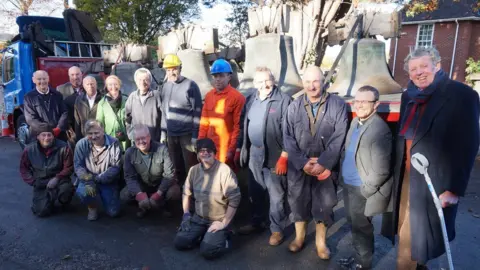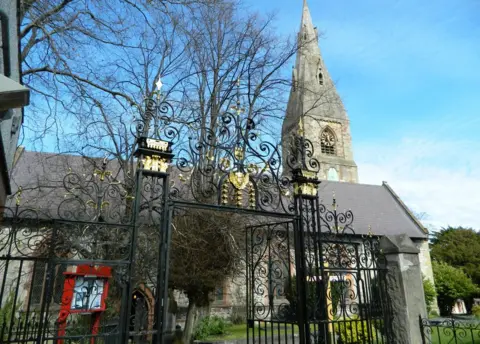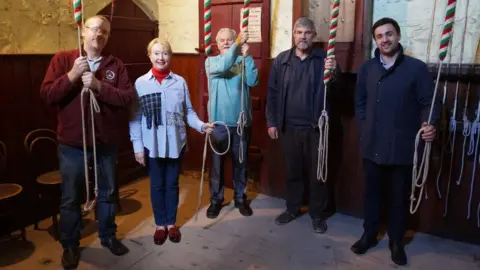Ruthin church's bells ring again after more than 40 years
 Dylan Parry Jones
Dylan Parry JonesA Welsh town is once again alive to the sound of ringing church bells after a restoration grant of almost £100,000.
The eight bells of St Peter's in Ruthin, Denbighshire, date back to the mid-1800s but had not rung regularly since the 1970s.
One of the bells was named "Lottie" in recognition of the National Lottery, which helped fund the restoration.
Aspiring ringers will now have the chance to learn for free, said Peter Furniss from the restoration committee.
A "great bell" has been rung at St Peter's since at least 1654, and by 1788 the church had a peal of six.
These were replaced in 1843 and two new trebles added in 1889.
The Grade I-listed church's belfry and ringing room were also restored in the £191,000 project, which was made possible with a £96,300 National Lottery grant.
 Dylan Parry Jones
Dylan Parry JonesOne bell in particular, the fifth bell, was badly cracked and had to be repaired by a specialist welding company - the only one of its kind left in the UK - before it could chime again.
At one point, there would have been a "curfew bell" which would have warned residents they must be indoors by 20:00 or face being "arrested and taken to Ruthin jail", explained Mr Furniss, a ringer for the North Wales Association of Church Bell Ringers.
 Dylan Parry Jones
Dylan Parry JonesBecause of its deterioration, Mr Furniss said this bell could only be rung weekly from the mid-1970s onwards.
"Thanks to this funding, we've not only been able to restore that bell but add an electronic mechanism so it chimes automatically at 20:00 every day," he added.
"Though of course we won't be throwing anyone in jail for staying outdoors after hours anymore."
The restoration involved children from local schools, who visited the church to learn about the bells and see the bells being rung.
Thanks to the use of "modern fittings and the latest design techniques", the bells are now easier to handle and the church has been able to offer bell ringing training.
 Dylan Parry Jones
Dylan Parry JonesThe offer had been "taken up with great enthusiasm" by 19 trainees, aged between 18 and 70, Mr Furniss said.
Traditions such as bell ringing "form part of local people's identity", said Stephen Barlow, from the National Lottery Heritage Fund.
"Not only that, but the improvements will mean bell-ringing can be opened up to a wider group of people who otherwise may not have had reason to step inside their local church," he said.
